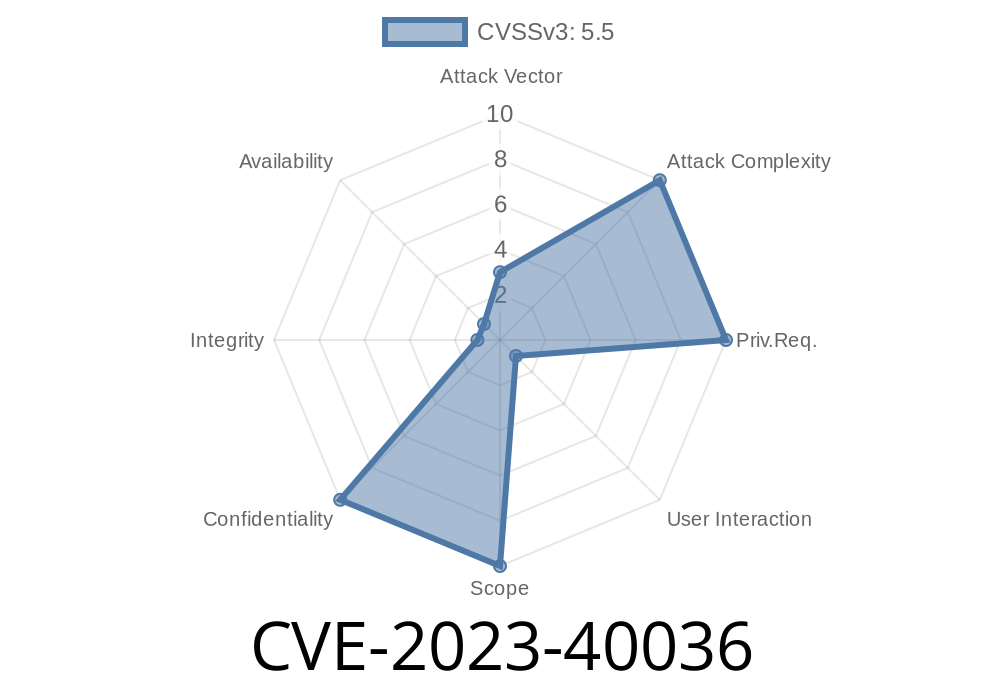Notepad++ is a widely-used, free and open-source text editor, popular among developers, students and anyone who needs to handle source code or plain text files. But like any large software, it’s not immune to security vulnerabilities. In August 2023, a new vulnerability was discovered in Notepad++ versions 8.5.6 and earlier, tracked as CVE-2023-40036.
This article will break down what CVE-2023-40036 is, what causes it, how it could be exploited, and where to look for more information. We’ll keep the explanation straight-forward and beginner-friendly, so everyone can understand what’s at risk—even if you’re not a security expert.
What Is CVE-2023-40036?
CVE-2023-40036 is a vulnerability involving a global buffer read overflow found in the way Notepad++ handles certain text encoding analysis. Specifically, the problem lies in the function CharDistributionAnalysis::HandleOneChar, which processes character data to help Notepad++ guess what encoding a file is using.
A “buffer overflow” means that a program reads or writes outside of the boundaries of a block of memory it is supposed to use. A *read* overflow means it might leak information from adjacent memory, sometimes revealing sensitive details or internal program state.
In less technical terms: if a specially prepared or “malicious” file is opened, Notepad++ might accidentally read some of its own sensitive information and (in rare cases) might leak it.
Where in the Code? (Technical Snippet)
The issue is rooted within the CharDistributionAnalysis class, especially in its HandleOneChar function. Below is a simplified pseudo-code snippet (adapted for clarity from the original source code):
#include "CharDistributionAnalysis.h"
void CharDistributionAnalysis::HandleOneChar(const char* buf, size_t offset, size_t charLen)
{
// Vulnerable code:
mTotalChar++;
unsigned int order = GetOrder(buf + offset, charLen);
if (order < mTableSize)
{
if (mCharToFreqOrder[order] < 512)
mFreqChar++;
}
// ... other code ...
}
Where is the issue?
If GetOrder() returns a value higher than mTableSize, or if mCharToFreqOrder isn’t large enough, the code may read outside the array boundaries, accessing unrelated or sensitive memory.
What’s the Risk?
The immediate exploitability of this bug is unclear. So far, no one has shown a way to use this to run malicious code on your computer. However, buffer overflows can lead to:
- Information leakage: Revealing bits of memory used for internal operations, which might help attackers mount more advanced attacks or bypass other security systems.
Crashes: Causing Notepad++ to freeze or close unexpectedly, resulting in denial of service.
Experts believe (at the time of publishing this post) it may be theoretically possible for a skilled attacker to use a specially crafted file to extract internal data. However, this currently requires further research.
Here’s a simple scenario
1. The attacker crafts a file with a bad encoding, designed to trigger the buggy code path in HandleOneChar.
You open this file in Notepad++ (version 8.5.6 or earlier).
3. In the right circumstances, Notepad++ could leak some memory info, either to the screen or to a crash report.
Sample proof-of-concept (for educational purposes only)
# A simple Python script to create a test file
# with a long string which may trigger issues in Notepad++.
with open("poc.txt", "wb") as f:
# Repeat bytes that could trigger problematic behavior
f.write(b"\xFF" * 300)
This file, when opened, might cause weird crashes or memory leaks if the vulnerability is triggered.
Note: No reliable remote code execution or data theft exploit is known as of June 2024.
Check for updates.
As of now, there’s no patch available, but this might change on the official Notepad++ GitHub page.
Watch security tracking websites:
- National Vulnerability Database (NVD) Entry for CVE-2023-40036
- Notepad++ official Issues
- Exploit Database
There is *no patch* as of June 2024—be cautious when handling unknown files in Notepad++.
- Keep an eye on Notepad++ GitHub for any fixes.
Summary:
CVE-2023-40036 is a technical risk but not yet a high-profile attack vector. It’s a good example of why safe browsing and careful file handling is always important, especially when using open-source tools. Stay updated, and be safe!
Timeline
Published on: 08/25/2023 20:15:08 UTC
Last modified on: 08/31/2023 18:11:35 UTC
